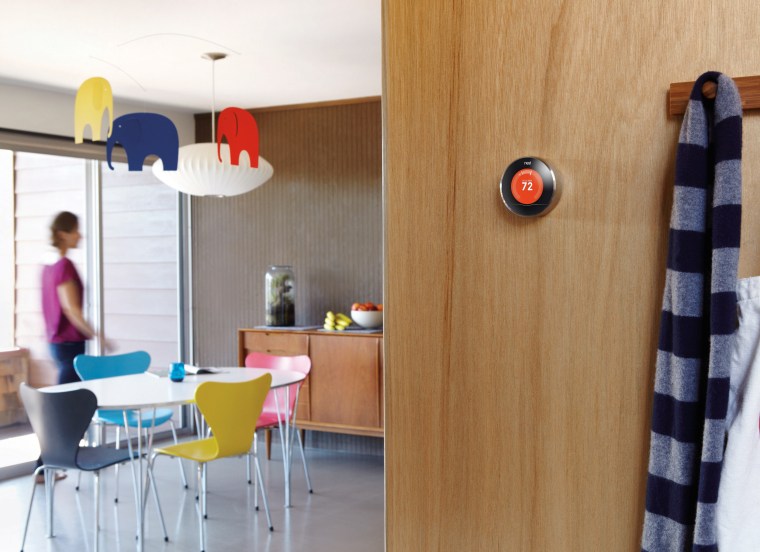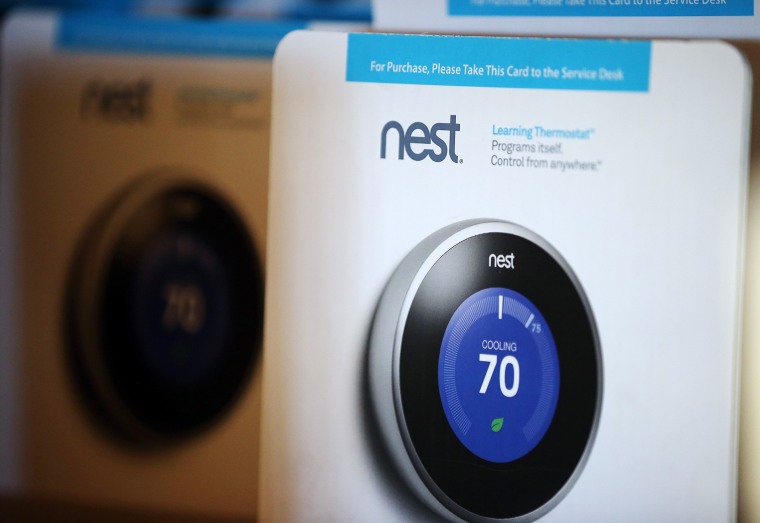
Google’s making itself at home.
The search engine giant has shelled out $3.2 billion to buy Nest Labs, the maker of super-sleek appliances including a thermostat that looks like it’s out of a sci-fi movie. It’s Google’s big push to get into the lucrative and growing market of connected homes.
Nest is best known for its “Learning Thermostat,” which figures out users’ daily habits. The technology is already savvy enough, for example, to know not to blast cool air through the house on a hot summer’s day if everyone has already left for work.
In short, Nest understands what users are doing every day in a way that Google’s own search engines and tablets don’t reach. It’s a truly home-centered device that gives Google a view into how people live in the physical world, and not just how they live online.
“The two companies may seem different, but at their core, they’re both heavily focused on understanding the behavior of individuals,” said Anind Dey, associate professor at Carnegie Mellon's Human-Computer Interaction Institute.

“People have tablets and phones, but we don’t think of them as home appliances,” Dey added. “[Nest] is something that’s in your house, on your wall, and it knows when you come and go.”
Those types of built-in and outwardly innocuous devices make up the dream of the so-called “connected home,” where extremely sophisticated tech is as everyday as the family goldfish.
For years and years, technology trade shows have crowed that they were close to developing devices that would all connect to one another. In this connected “Internet of Things,” a homeowner could unlock her front door, check her tire pressure, and make sure the dishwasher is off, all while sitting in front of her desktop at work.
So far that has been a pipe dream, but the technology – hardware, operating systems and connectivity – could finally be coming together. Loads of companies including Microsoft, Sony, Intel and AT&T are working to make the connected home a reality, and while no company has quite figured it out yet, they have huge financial incentive to do so: Cisco predicts the “Internet of Things” economy will reach $14.4 trillion spread over the next decade.
Nest gives Google a foot in the door of that potentially lucrative space. Google has made clear that it wants to be on the forefront of innovation, and after getting itself on peoples’ faces with Google Glass and commuters behind the wheel of a driverless car, conquering the domestic sphere seems to be the logical next step.
“The first 15 years of Google and the first 20-odd years of the web have been focused on human beings,” said Sanjay Sarma, an associate professor of mechanical engineering at MIT. “The next era is going to be inanimate things. Google knows that.”
For companies like Google, the appeal of these inanimate, Internet-connected “things” is the data they transmit. Nest’s data could provide Google with deep insights into its customers’ daily habits — particularly when combined with all that Google already knows about those users from their web searches to emails to phone use.
Such a combination is mouthwatering for companies like Google – but not everyone is likely to see a Google-connected device as just another piece of furniture. Nest issued a statement on Monday assuring customers that its privacy policy “clearly limits the use of customer information to providing and improving Nest’s products and services. We’ve always taken privacy seriously and this will not change.”
However, Nest’s statement doesn’t exclude possibilities like Google using anonymized data that can’t be tied back to any specific user – which could still be extremely valuable. Both Nest and Google declined to comment beyond the statements the companies issued on Monday.
No matter how Google harnesses Nest and its data in the future, Sarma, the MIT professor, thinks this is the acquisition that will push home automation further into mainstream reality.
“A large, credible company like Google entering the fray really accelerates how quickly [home automation] will move,” Sarma said. “It’s a lightning rod.”
Dey disagreed.
“For the last 20 years we’ve always said we’re 10 years away from the full, mainstream Internet of Things. I still feel that way today,” Dey said. “I still think this is a very limited step.”
Instead, Dey said, the key is partnerships between companies that each provide a part of the system. While niche products like Nest’s thermostat may take off, a major shift won’t happen until big appliance companies ink deals with firms that are able to support the underpinnings of a system of connected devices.
“We’re talking about hardware, software, the cloud, connectivity,” Dey said. “It’s a complex things, and we’re making progress over the years. But like lots of huge innovations, it’s the partnerships that make it work.”
Julianne Pepitone is a senior technology writer for NBC News Digital. Previously she was a staff writer at CNNMoney, where she covered large tech companies including Apple and Google, as well as the intersection of tech and media. Follow Julianne on Twitter at @julpepitone or email her at julianne.pepitone@nbcuni.com.
.